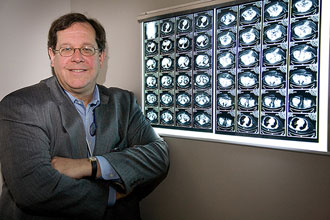Major Player Joins Prostate Cancer Team
Prostate cancer is a formidable opponent: it is the second leading cause of cancer death in men. Tulane's prostate cancer team recently recruited a major player Dr. Oliver Sartor in the fight against the disease. Sartor is the only medical oncologist in Louisiana specializing in the treatment of prostate cancer patients.

Dr. Oliver Sartor, the new Piltz Professor of Cancer Research in the medicine and urology departments, is a renowned prostate cancer expert. (Photo by George Long)
The arrival of Sartor, the new Piltz Professor of Cancer Research in the medicine and urology departments of Tulane School of Medicine, helps to complete the world-class prostate cancer team at the Tulane Cancer Center.
The team includes urologists, medical oncologists, radiation oncologists, a clinical psych-oncologist, and basic science researchers who focus on translating laboratory discoveries into clinical trials and possible new treatments for prostate cancer.
“The care of prostate cancer patients is inherently multidisciplinary,” says Sartor, who, by the way, is a graduate of Tulane School of Medicine. “The key to providing our patients with the best possible care is to involve a team of experts from all disciplines in the decision-making process.”
Sartor joins forces with Dr. Raju Thomas, chair of the urology department, who has put Tulane on the map for use of advanced technologies to manage localized prostate cancer.
“Tulane was the first in the state to offer cryosurgery as an option for prostate cancer in 1993,” says Thomas. “We were the first in the Gulf South to offer laparoscopic radical prostatectomy in 1998, and we were the first to use the DaVinci robot for robotic radical prostatectomy in 2003.”
Thomas' program was also the first in the Gulf South to offer prostate cancer screening clinics, and in 1991 he initiated the state's first prostate cancer support group.
Together, Sartor and Thomas are overseeing the prostate cancer program that offers state-of-the-art clinical and surgical care. Plans are to offer clinical trials with novel agents or combinations of agents, familial risk clinics, and year-round prostate cancer screening and patient support services that distinguish Tulane as the preeminent prostate cancer referral center in the region.
Approximately 17 percent of men will develop prostate cancer in their lifetimes. In Louisiana, 3,640 prostate cancer cases were diagnosed last year.
“To support and promote the growth of our clinical efforts, we also recruited a team of distinguished basic science researchers who focus on prostate cancer,” says Prescott Deininger, interim director of the Tulane Cancer Center. “Nick Makridakis, Yan Dong, Haitao Zhang and Zongbing You join our veteran prostate cancer researcher Asim Abdel-Mageed, to round out an impressive and distinctive basic science lineup.”
Before joining Tulane's faculty, Sartor was an associate professor in the Lank Genitourinary Oncology Center at Harvard's Dana-Farber Cancer Institute in Boston. He is chair-elect of the Department of Defense Prostate Cancer Integration Panel, which directs over $70 million in federal funding for prostate cancer research.
Melanie Cross is manager of communications for the Tulane Cancer Center.
